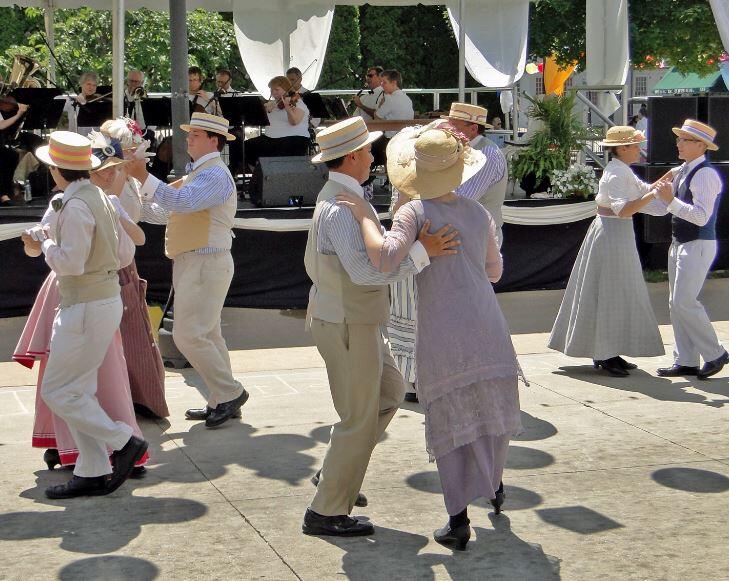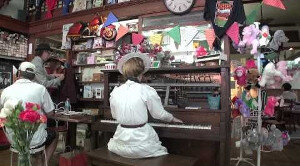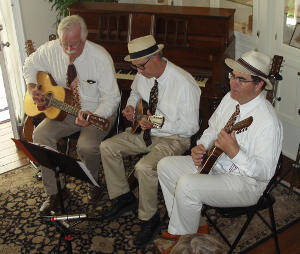Northern California’s gold rush town of Sutter Creek, in the Sierra foothills southeast of Sacramento, hosted its annual ragtime festival August 9-11 this year under new management. Architecturally the town exudes ragtime era ambiance. The festival’s unique features include the local Ice Cream Emporium as a venue and a ragtime era Victorian mansion where owner Chip Lusby welcomes visitors and musicians each evening to socialize after formal festivities have ended.
The story of the festival begins in the early 1980s. Young ragtime pianist Stevens Price, duly impressed by Keith Taylor’s playing at Maple Leaf Club meetings in Los Angeles, purchases a copy of Taylor’s cassette and asks Taylor to autograph it. Years pass. Price opts for small town living and moves his piano and family to the hills. Taylor retires from teaching music in the L.A. public schools. He and his wife move to southern Oregon where he regularly tunes, repairs, and performs on the pianos in every California gold rush town south to Oakhurst.
In 1998, making his regular circuit, Taylor stops at the Ice Cream Emporium in Sutter Creek, discovers the piano, and asks permission to play a few tunes. Proprietor Stevens Price nearly drops a banana split: “Hey, you’re the guy I met years ago at the Maple Leaf Club!” To the delight of the customers, the two spend the evening playing ragtime. They also start initiating plans for the first Sutter Creek Ragtime Festival held August 13-15, 1999, under the aegis of the newly formed Mother Lode Ragtime Society. The festivals continue annually with a good audience and strong support from the local business community. In 2008 Price relinquishes management of the festival.
 In 2018 a dispute with the city over permit conditions for placing the festival ticket sales tent in the public street area occasions a plan to move the festival from Sutter Creek to the town of Woodland. However, scheduling conflicts cause that plan to be abandoned and Mother Lode to cancel the 2019 festival. Stevens Price to the rescue. He forms the Sierra Foothills Ragtime Society, and initiates the festival’s second iteration, dubbed the “Historic Sutter Creek Ragtime Festival.” His plans also include a 2020 edition and 501(c)(3) nonprofit tax status.
In 2018 a dispute with the city over permit conditions for placing the festival ticket sales tent in the public street area occasions a plan to move the festival from Sutter Creek to the town of Woodland. However, scheduling conflicts cause that plan to be abandoned and Mother Lode to cancel the 2019 festival. Stevens Price to the rescue. He forms the Sierra Foothills Ragtime Society, and initiates the festival’s second iteration, dubbed the “Historic Sutter Creek Ragtime Festival.” His plans also include a 2020 edition and 501(c)(3) nonprofit tax status.
The festival encompassed four venues, all within walking distance. Unfortunately the historic theater, vintage 1919, used for past festivals, had already been booked for another show. The substitute City Hall Auditorium left much to be desired in acoustics and ambiance. The conference room venue at the Hotel Sutter is commodious and comfortable. Originally constructed in 1868 but remodeled since, the hotel retains much of its original charm. The elegant, cozy Foxes Bed and Breakfast provides a close-up listening experience. The Ice Cream Emporium, occupying a building dating from the 1850s, holds an upright piano, a real soda fountain, and tables and chairs for listening while consuming the frosty treats.
Eleven performing acts, including both individual instrumentalists and groups, entertained with a balanced program of ragtime and related musical styles. Sessions were half-hour or 45 minutes, with lengthier variety concerts on Saturday and Sunday afternoons, and many memorable moments. Classic ragtime was well represented by pianists John Remmers from Ann Arbor, MI, specialist in the rags of Charles L. Johnson (“Dixie Twilight,” “Porcupine Rag”); John Reed Torres, from Los Angeles, performing his own inspired new rags that sound old (“Black Lightning”) and compositions of Scott Joplin (“Gladiolus Rag”) and Arthur Marshall (“Little Jack’s Rag”); and Virginia Tichenor, daughter of the late ragtime scholar Trebor Tichenor (Charles Hunter’s “Just Ask Me”).

Brian Holland, accompanied by percussionist Danny Coots, focused on stride (“Stompin’ ‘Em Down”), and Carl Sonny Leyland on boogie. Kylan deGhetaldi also embraced stride (Willie “The Lion” Smith’s “Keep Your Temper” and Fats Waller’s “Minor Drag”). Anthony Sarginson, 18, who found ragtime six years ago and became passionate about it, was a surprise performer of compositions of his own and by Tom Brier. Virtuoso Frederick Hodges, who regularly drew full houses for his sessions, featured pieces from the Great American Songbook but also scored with Joplin’s difficult march “Antoinette.” Flutist Julia Riley accompanied by Michael Chisholm on piano essayed Harry P. Guy’s “Pearl of the Harem.” Pianist Pat Aranda and class vocalist Amanda Castro introduced a bit of jazz with “South Rampart Street Parade.”

In an exciting development, string band ragtime returned to the scene with the Easy Winners in the persons of Nick Robinson of the late, lamented Ragtime Skedaddlers, and Zack Salem. Their primary instrumentation is guitar and mandolin but both performers double on various stringed instruments and contribute vocals. Robert Armstrong, billed as a “special guest,” added Hawaiian steel guitar, banjo, and musical saw to the sound. Their wide-ranging repertoire included “Sacramento” by Harry von Tilzer, the Mexican waltz “Over the Waves,” “The Chrysanthemum” by Joplin, and the Dixie standard “High Society” as arranged by the by the Six and Seven-Eighths String Band of New Orleans.
Other groups performing included the venerable Porcupine Ragtime Ensemble, the Raspberry Jam Band, and Virginia Tichenor’s newly formed Key System Rhythm Ramblers.
After hours conviviality prevailed thanks to Chip Lusby’s unmatched hospitality. Festival attendees were invited to his impressive Victorian mansion in Skunk Hollow which he has assembled from sections of houses scheduled for demolition and refurbished over decades. With a complement of three pianos, Chip’s place syncopated into the wee hours.
Thanks to the late Nan Bostick for notes on the genesis of the festival, which I excerpted from the festival scrapbook.
Fred Hoeptner is a Ragtime historian and composer of new ragtime pieces frequently performed today. He was a founder of the John Edwards Memorial Foundation which was a non-profit of the University of California at Los Angeles to promote the study and dissemination of knowledge about American folk music of the 1920s-1940s. It is part of the University of North Carolina at Chapel Hill’s Southern Folklife Collection today and contains several important taped interviews Fred conducted in the 1950s.





















